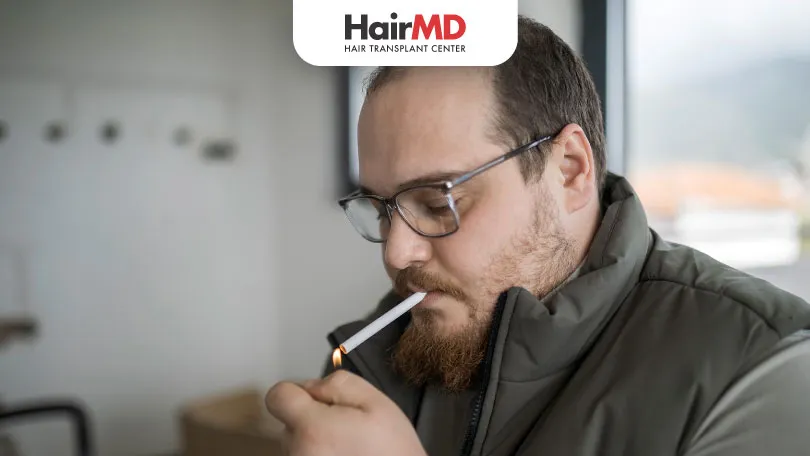8th Feb, 2024

What’s covered in the article?
- What is Hair Loss?
- Does Smoking Cause Hair Loss?
- Is Hair Loss Due to Smoking Reversible?
- What are the Treatments for Hair Loss due to Smoking?
- How to Quit Smoking to Stop Hair Loss?
- Conclusion
What is Hair Loss?
Hair loss is a hair condition where more than 100 hair strands fall out daily with no signs of regrowth, leading to baldness. Hair loss occurs due to disturbance in the natural hair growth cycle that consists of three phases- growth, rest, and fall. Many external and internal factors may lead to hair loss, some of which can be reversed while others can only be slowed down.
Does Smoking Cause Hair Loss?
Yes, smoking causes hair loss due to a lot of reasons, including:
-
It Triggers Androgenetic Alopecia
Nicotine present in cigarettes and tobacco triggers androgenetic alopecia, which is referred to as a male pattern of baldness.
-
Oxidative Stress
Oxidative stress due to smoking activates free radicals that attack hair follicles and cause hair loss.
-
Reduced Blood Flow
Smoking cause hair by reducing blood flow. Smoking may build plaque in blood vessels, leading to severe cardiac problems and reduced blood flow to the scalp.
-
Makes Hair Brittle and Dry
Reduced blood flow and smoke particles make hair brittle, dry and dull, which falls out easily.
Is Hair Loss Due to Smoking Reversible?

Hair loss due to smoking can be reversed if the damage is due to poor blood circulation, stress or brittle hair due to smoke particles. If you stop smoking, hair may regrow; however, you must follow a healthy lifestyle and diet to promote good hair health. On the other hand, if smoking has caused androgenetic alopecia, then it can only be slowed down with dermatological treatments.
What are the Treatments for Hair Loss due to Smoking?
The following treatments can treat smoking and hair loss:
-
Medications
Minoxidil and finasteride are the common topical medications prescribed by dermatologists.
-
Laser Therapy and Hair Transplant
Low-level laser therapy and hair transplant are some options that you can go for.
-
Lifestyle Management
Reducing stress by performing yoga and exercises, involving yourself in activities and consuming a proper diet can also help.
How to Quit Smoking to Stop Hair Loss?
Smoking causes hair loss due to the presence of nicotine in it. You can quit smoking by trying support therapies, nicotine replacement gums and inhalers, and medications helping to quit smoking. Avoiding smoking environments, keeping yourself busy, and therapies like acupuncture can also help.
Do You Know?
Nearly 250 Patients Visit HairMD
Everyday For Various Hair Concerns?
(You are one click away from flawless skin)
Meet Our Dermatologists
Conclusion
Smoking can have a significant negative impact on hair health, contributing to hair loss through various mechanisms such as reduced blood flow, increased inflammation, and damage to hair follicles. While quitting smoking is essential for overall health, it also plays a crucial role in preventing or slowing down hair loss. By making positive lifestyle changes, including maintaining a balanced diet, managing stress, and seeking professional advice when needed, individuals can improve their hair health and reduce the risk of smoking-related hair loss.
If you suffer from excessive hair loss and want to know if there is a connection between smoking and hair loss, you must visit an expert dermatologist immediately. The hair doctor will help you treat the cause to prevent permanent damage.
Further Reading
Chronic Headaches Linked to Hair Loss?
Explore the link between chronic headaches and hair loss. Learn about causes, triggers, and effective management strategies from the experts at HairMD.
Can a Short Haircut Reduce Hair Loss?
This article explains the facts about haircuts and hair loss, including tips for hair care and effective ways to deal with hair fall.
How Much Hair Loss is Normal for Teenage Male?
Understand normal hair loss in teenage males and when it may signal an issue. Visit HairMD Pune for expert advice on teenage hair health and treatment options.
Powerful Home Remedies for Itchy Scalp
Discover Home Remedies for Itchy Scalp relief with remedies like aloe vera, tea tree oil, and apple cider vinegar. Get expert tips at HairMD!
Have thoughts? Please let us know
We are committed not only to treating you, but also educating you.











